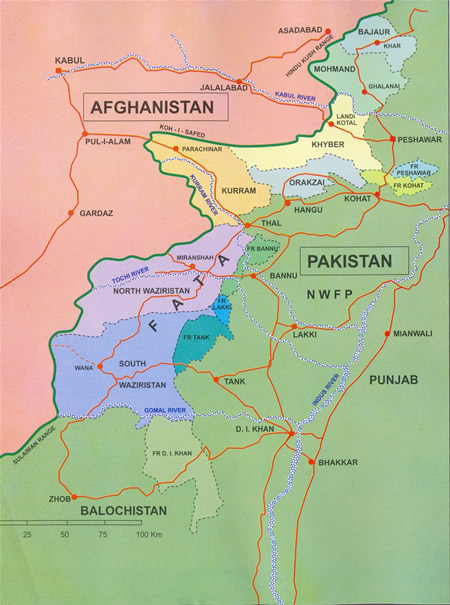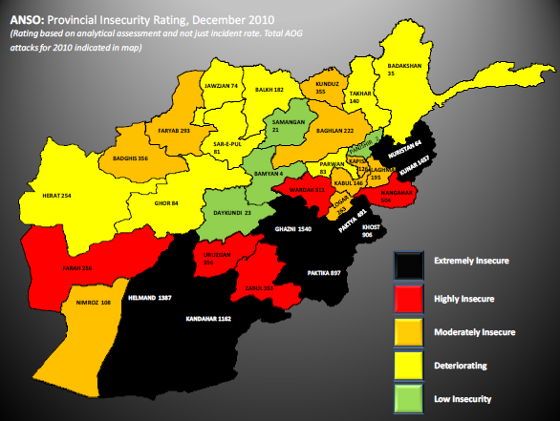From The Long War Journal:

Jan 31, 2011 (13 hours ago)
Al Qaeda leader kidnaps 21 Afghan tribal leaders in Kunar
from The Long War Journal

Qari Zia Rahman and a map of northeastern Afghanistan and northwestern Pakistan. Map from the Asia Times; click to view.
A dangerous, dual-hatted Taliban and al Qaeda commander has kidnapped 21 Afghan tribal leaders in the eastern province of Kunar.
Qari Zia Rahman, a regional commander who leads forces on both sides of the Afghan-Pakistani border, summoned the tribal leaders to a meeting in the district of Marawara eight days ago, then kidnapped them.
"The Taliban first called them for a meeting at a mosque and after a discussion, the Taliban took all the elders away to an unknown place," a local Afghan official in Kunar told AFP.
Qari Zai claimed the kidnapping in a text message sent to an AFP reporter, and demanded local Afghans end their cooperation with the Afghan government and security forces.
"The reason behind this act is that some relatives, sons and close family members of these men, work in the Afghan army, Afghan police and some with NATO", Qari Zia text read.
"Unless these people do not resign their jobs with the army, police and NATO, we will not release the hostages."
The district of Marawara, which directly borders Pakistan, is a known haven for al Qaeda and the Taliban. The US and Afghan forces targeted Qari Zai in three raids in the district during the summer of 2010. On June 29, the US launched a battalion-sized operation. More than 150 Taliban fighters were reported killed in the operation. On July 20, US and Afghan forces launched another battalion-sized operation in Marawara to flush out Qari Zia. And on Aug. 2, combined forces conducted a raid, again in Marawara, that targeted the al Qaeda leader.
Qari Zia is the Taliban's top regional commander as well as a senior member of al Qaeda. He operates in Kunar and neighboring Nuristan province in Afghanistan, and he also operates across the border in Pakistan's tribal agency of Bajaur. In early 2010, the Pakistani government claimed they killed Qari Zia in an airstrike, but he later spoke to the media and mocked Pakistan's interior minister for wrongly reporting his death.
Qari Zia is closely allied with Faqir Mohammed as well as with Osama bin Laden. Qari Zia's fighters are from the Caucasus, Uzbekistan,Turkmenistan, Afghanistan, and various Arab nations. He commands a brigade in al Qaeda's paramilitary Shadow Army, or the Lashkar al Zil, US intelligence officials have told The Long War Journal.
The terrorist commander has established training camps for female suicide bombers in both Pakistan and in Kunar in Afghanistan.
A female suicide bomber struck for the first time in Afghanistan in Kunar province on June 21, 2010. Two US soldiers were killed and two Afghan children were wounded in the attack. Qari Zia claimed credit for the bombing.
The next female suicide attack took place on Dec. 24, 2010, in Pakistan's tribal agency of Bajaur. The suicide bomber killed 42 Pakistani civilians in an attack at a World Food Program ration distribution point.
Kunar province is a known sanctuary for al Qaeda and allied terror groups. The presence of al Qaeda cells has been detected in the districts of Pech, Shaikal Shate, Sarkani, Dangam, Asmar, Asadabad, Shigal, and Marawana; or eight of Kunar's 15 districts, according to an investigation by The Long War Journal.
A dangerous, dual-hatted Taliban and al Qaeda commander has kidnapped 21 Afghan tribal leaders in the eastern province of Kunar.
Qari Zia Rahman, a regional commander who leads forces on both sides of the Afghan-Pakistani border, summoned the tribal leaders to a meeting in the district of Marawara eight days ago, then kidnapped them.
"The Taliban first called them for a meeting at a mosque and after a discussion, the Taliban took all the elders away to an unknown place," a local Afghan official in Kunar told AFP.
Qari Zai claimed the kidnapping in a text message sent to an AFP reporter, and demanded local Afghans end their cooperation with the Afghan government and security forces.
"The reason behind this act is that some relatives, sons and close family members of these men, work in the Afghan army, Afghan police and some with NATO", Qari Zia text read.
"Unless these people do not resign their jobs with the army, police and NATO, we will not release the hostages."
The district of Marawara, which directly borders Pakistan, is a known haven for al Qaeda and the Taliban. The US and Afghan forces targeted Qari Zai in three raids in the district during the summer of 2010. On June 29, the US launched a battalion-sized operation. More than 150 Taliban fighters were reported killed in the operation. On July 20, US and Afghan forces launched another battalion-sized operation in Marawara to flush out Qari Zia. And on Aug. 2, combined forces conducted a raid, again in Marawara, that targeted the al Qaeda leader.
Qari Zia is the Taliban's top regional commander as well as a senior member of al Qaeda. He operates in Kunar and neighboring Nuristan province in Afghanistan, and he also operates across the border in Pakistan's tribal agency of Bajaur. In early 2010, the Pakistani government claimed they killed Qari Zia in an airstrike, but he later spoke to the media and mocked Pakistan's interior minister for wrongly reporting his death.
Qari Zia is closely allied with Faqir Mohammed as well as with Osama bin Laden. Qari Zia's fighters are from the Caucasus, Uzbekistan,Turkmenistan, Afghanistan, and various Arab nations. He commands a brigade in al Qaeda's paramilitary Shadow Army, or the Lashkar al Zil, US intelligence officials have told The Long War Journal.
The terrorist commander has established training camps for female suicide bombers in both Pakistan and in Kunar in Afghanistan.
A female suicide bomber struck for the first time in Afghanistan in Kunar province on June 21, 2010. Two US soldiers were killed and two Afghan children were wounded in the attack. Qari Zia claimed credit for the bombing.
The next female suicide attack took place on Dec. 24, 2010, in Pakistan's tribal agency of Bajaur. The suicide bomber killed 42 Pakistani civilians in an attack at a World Food Program ration distribution point.
Kunar province is a known sanctuary for al Qaeda and allied terror groups. The presence of al Qaeda cells has been detected in the districts of Pech, Shaikal Shate, Sarkani, Dangam, Asmar, Asadabad, Shigal, and Marawana; or eight of Kunar's 15 districts, according to an investigation by The Long War Journal.






![iraq_bloodiestday_twomonths.jpg [A massive car bomb ripped through a funeral ceremony in a Shiite district of Baghdad on Thursday, killing 48 people in Iraq's bloodiest day in more than two months. (AFPTV) ]](http://www.commondreams.org/files/article_images/iraq_bloodiestday_twomonths.jpg)
